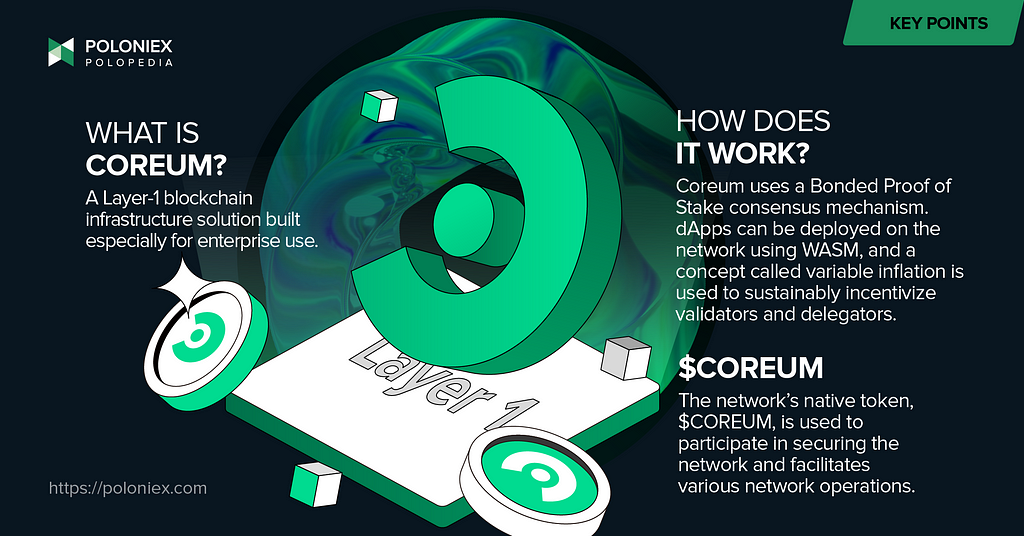Some of the challenges faced by enterprise grade blockchains today include scalability and limited interoperability. A business or governmental organization has to be able to rely on the transaction speed and cost of any distributed network it uses, as these entities have many users depending on their smooth operation. And in order for users to be able to take advantage of different features on different blockchains, they need to be interoperable with each other.
A blockchain infrastructure provider has to be able to skill smoothly as its business clients grow. After all, you wouldn’t want a network’s limitations to get in the way of your company’s future goals. What you would need is a Blockchain with high throughput, low latency, and strong security.
Coreum is a Layer 1 Enterprise Grade Blockchain, which means it is geared toward business use cases. It provides the infrastructure for use cases like digital assets, issuing stablecoins, traditional asset tokenization, CBDCs, smart tokens and NFTs.
With Coreum, users can deploy what are called smart tokens, which are programmable assets that differ from smart contracts. This means that these tokens can execute contract-like functions while using their chain’s storage.
Some examples of programmable tokens are:
Soulbound NFs: Records & Credentials
Tokenized Securities
Programmable money

How does Coreum work?
Coreum provides infrastructure for enterprises, which means that the network is built to handle a lot of demand. Currently, the network can handle a whopping 7000tps with only 1.5 second block time.
It is built using the Cosmos SDK, which means that it can benefit from byzantine fault tolerance, and the tendermint consensus engine, which is a bonded proof of stake consensus mechanism. In order to ensure that it can provide the service scalability that enterprises need, Coreum is pouring resources into the research and development of the use of sidechains.
For the part of interoperability with other Cosmons-SDK-based chains, it employs the use of the Inter-Blockchain Communication Protocol (IBC). This way, enterprises that use Coreum can do so seamlessly while interacting with other chains. Going further, the network has positioned itself as one that can serve financial institutions by adhering to ISO20022, which is a standard for communication between financial institutions. To make the platform developer friendly, dApps are able to be coded in different languages using WebAssembly (WASM).
Coreum employs the use of Cosmos’s Tendermint consensus engine, which means it has what is called a Bonded Proof of Stake consensus mechanism. What this entails is that participants can opt to set aside their stake to participate in block generation, but otherwise can still contribute to the security and maintenance of the network without operating a node.
Coreum uses a variable inflation model in order to incentivize block creation. Tokens are minted and added to a rewards pool with fees to reward delegators and validators. The reward amount is inversely proportional to the Total Value Locked, which is meant to foster sustained participation in the security and maintenance of the network.
Smart tokens
Smart tokens are Coreum’s solution to weighty smart contract transactions that tend to clog up even more scalable networks. That is, these tokens can function and execute actions without calling a smart contract function because their features are known to the blockchain. What this yields are transactions that are more reliable, faster, and more secure.
Let’s talk a bit about the question of reliability and why this is important for DeFi applications, and moreover, adoption. One of the main things that plagues DeFi right now is exorbitant gas fees. And because network activity fluctuates, fees are quite mercurial. For your average crypto enthusiast this may not be a problem. But for a governmental organization, a late adopter? This unpredictability is a deal breaker. Smart tokens offer fixed transaction fees, so that any use will know the cost up front. And there is a discount for bulk transactions, something that is especially useful for enterprises.
Now let’s talk about security. With a smart contract, every smart contract deployed on a chain must be audited. Of course, by now we’re all familiar with the host of smart contract exploits. With smart contracts, because the code is known to the exchange and audited several times, that risk is severely reduced.
So what makes a smart token smart? Like a smart contract, these tokens can execute different functions. And like a smart contract, once a token is issued, its attributes cannot be changed. These smart tokens can also interact with smart contracts for added customization.
All smart tokens developed using Coreum have common functions like minting, burning, and sending. These functions are meant to keep with common needs within DeFi and functionality will expand as time goes on and new use cases come into common practice.
$COREUM
This is Coreum’s native token. As the network uses a bonded proof of stake consensus mechanism, delegators and validators use $COREUM to secure the network and receive rewards. The team behind Coreum decided to allocate 50% of the token’s current supply to community members through airdrops, ensuring that there is sufficient community ownership over the well-being and future of the project.
What’s next for Coreum?
For the time being, the Coreum roadmap is focused on interoperability and building out its ecosystem, with implementation of the aforementioned Inter-Blockchain Communication Protocol (IBC) to avail communication between it and other Cosmos-based networks as well as a decentralized exchange.
How to acquire $COREUM?
$COREUM is available on multiple exchanges like Poloniex! You can acquire $COREUM through trading a USDT/COREUM trading pair. Please note that on Poloniex, the token’s symbol is $COREUM as opposed to $CORE to distinguish it from the token for the PoW x DPoS blockchain project Core.
Feeling ready to get started? Sign-up is easy! Just hop on over to https://poloniex.com/signup/ to start your crypto journey🚀
was originally published in The Poloniex blog on Medium, where people are continuing the conversation by highlighting and responding to this story.

